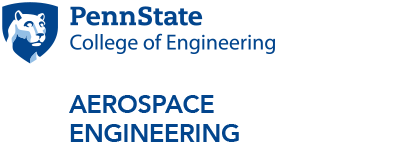
Graduate Studies
Launch a career that will shape society’s future — and yours.
A graduate degree from the Penn State Department of Aerospace Engineering is more than a piece of paper you can frame and hang in your office. It’s a pathway to a responsible and rewarding career in one of the most ever-evolving, critical fields that contribute to programs of national importance and have a significant, positive impact on global society and its future.
Penn State ranks as the #1 engineering school for aerospace and defense industry recruitment. It’s also home to a Vertical Lift Research Center of Excellence which is funded by the Department of Defense and NASA.
Our graduate programs provide outstanding research opportunities across a broad spectrum of topics relevant to industry today, and encompass both computational and experimental research approaches. Students may embrace traditional fields like aerodynamics, propulsion, flight science, vehicle dynamics, aeroacoustics, and rotorcraft engineering, as well as leading-edge research areas such as UAVs, commercial space, nanomanufacturing, and wind energy.
With 20 full-time, distinguished faculty, our department offers a tight-knit, collegial community that fosters innovation, learning, and collaboration among students, engineers, professionals in the aerospace industry, and government agencies. Each student receives individualized attention to develop a superior foundation for academic and professional success.
Students have access to a multitude of first-rate facilities to support their research, including subsonic and supersonic wind tunnels, indoor UAV flight space, turbine engines, helicopter rotor rigs, vibration and acoustics labs, and high-performance computer clusters.
Whether your career interest lies in industry, government, or academia, our graduate programs will provide the launching pad for a successful career that will help shape the future of our world.
Graduate Degree Programs
Master of Engineering (M.Eng.) in Aerospace Engineering
Application Deadline:We follow a rolling admissions process for the M.Eng. program. Application deadline for fall 2023 enrollment is December 15, 2022.
The M.Eng. is a non-thesis professional master’s degree. An intensive one-year, 30-credit program, the M.Eng. requires completion of a capstone experience. This is an ideal program for an engineer with a bachelor’s degree who wishes to expand his or her set of career possibilities in aerospace-related fields. It is also pursued by very highly qualified students who wish to accelerate progress towards a Ph.D. degree.
View core course requirements »
View degree requirements »
Master of Science (M.S.) in Aerospace Engineering
Application Deadline (with or without funding):
September 30, 2022, for spring 2023 enrollment
December 15, 2022, for fall 2023 enrollment
Spring admission decisions are typically made by mid-October. Fall admission decisions are typically made by mid-March or early April.
The M.S. is a thesis-based master’s degree having a significant research component. It requires a minimum of 30 credits and is designed to be completed in two years. This is an ideal program for an engineer with a bachelor’s degree who wishes to go deeper into research in specific areas of interest. The M.S. may be a terminal degree for students who intend to pursue research-related careers, or it may be a stepping stone en route to a Ph.D. degree.
View core course requirements »
View degree requirements »
Doctor of Philosophy (Ph.D.) in Aerospace Engineering
Application Deadline (with or without funding):
September 30, 2022, for spring 2023 enrollment
December 15, 2022, for fall 2023 enrollment
Spring admission decisions are typically made by mid-October. Fall admission decisions are typically made by mid-March or early April.
The Ph.D. is a thesis-based doctoral degree. It is very strongly research-oriented and is a terminal degree for students who intend to pursue careers in research and development, research management, or university teaching. It is an excellent program for an individual with a master’s degree in engineering, physical science, or mathematics who wishes to pursue a career in academic, governmental, and/or industry research in the field.
View core course requirements »
View degree requirements »
Minor in Computational Science
Application Deadline:Students must apply before their last semester.
Computational science involves using computers to study scientific problems, and complements the areas of theory and experimentation in traditional scientific investigation. Each student's program is planned by the student and a designated computational science adviser, in consultation with the graduate adviser in the student's major field.
For more information, see thePenn State Graduate Bulletin.



